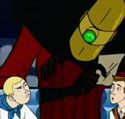|
Hawkperson posted:I like musescore Musescore is pretty dang good. The UI could use some work but overall it's great for a bit of free software.
|
|
|
|

|
| # ? Jun 1, 2024 17:10 |
|
Musescore's interface is a lot like Sibelius (at least the Sibelius I used 10ish years ago, who knows wtf it looks like now). but I like the keyboard shortcuts, it's great for knocking out something quickly
|
|
|
|
sibelius is good actually
|
|
|
|
sibelius failed a really valuable test in UI for me which is ďit would be faster to do this analog actuallyĒ granted i knew nothing about notation OR sibelius but i knew i wanted quarter notes on the staff and i kept just wanting a pencil and some blank staff paper
|
|
|
|
literally no computer program is faster for practical notation than just writing the score, unless you get really adept at said notation software by investing a bunch of time. you'll also probably get a better grasp of sheet music writing it out, the brain works in diverse ways. if you don't have staff paper, you can either just print a few sheets from a template, or grab a credit card/driver's license/ruler and just draw a few lines on a blank sheet. it doesn't matter if your clefs are ugly, just line them up right.
|
|
|
|
I'm still chasing the high of using the midi program that came with my parents CDROM drive in the late 90's but I don't know how much of that was being 8 and having nothing else to do. That said musescore 3 is fine but I have 2.4 on my Chromebook and its just not quite as good. I use guitar pro when I'm at my desktop.
|
|
|
|
|
I'm a Finale guy myself, but somebody gifted me their copy of Sibelius and yeah, it's pretty annoying to use. That said, MuseScore is free and totally fine.
|
|
|
|
creamcorn posted:literally no computer program is faster for practical notation than just writing the score, unless you get really adept at said notation software by investing a bunch of time. you'll also probably get a better grasp of sheet music writing it out, the brain works in diverse ways. i actually totally prefer paper in basically all contexts, but i wanted a computer program essentially to check my answers. i could notate stuff and then play it back ó see if it sounded like what i was expecting, then adjust if necessary.
|
|
|
|
Thereís gotta be an app that lets you take a pic of what youíve written and plays it for you. Thatís a thing in Sibelius if you wanna pay the $$$$ but I canít imagine someone else hasnít done it too
|
|
|
|
Hawkperson posted:Thereís gotta be an app that lets you take a pic of what youíve written and plays it for you. Thatís a thing in Sibelius if you wanna pay the $$$$ but I canít imagine someone else hasnít done it too There's this: https://apps.apple.com/us/app/sheet-music-scanner/id884984324 I bought it when I was working my way through the Levine Jazz Theory book because I can only play 2 songs by memory on piano and it was taking me forever the play any of the examples. It mostly worked, though it didn't quite handle 8 notes stacked on top of each other with a bag of sharps and flats sprinkled over them (ie half the book I was working through)
|
|
|
|
we have the technology, but its not perfect! an overview: https://en.wikipedia.org/wiki/Optical_music_recognition some open source offerings: https://github.com/topics/optical-music-recognition maybe one of these is particularly good with hand-written scores?
|
|
|
|
I really want to try my hand at making music, so I figured I'd start trying to learn music theory. Currently going through musictheory.net, and I have How to Compose Music open in another tab for after that - so far so good. I still feel like despite learning this stuff, I don't know if it will help me actually make good music. It might help me identify when I've written something bad, but I don't know yet whether I'll be able to write something good instead. I'm worried that all it will do is reveal how terrible I am and how many years I'd need to practice to get good.  I'm 31, so I feel like I'm starting way too late to try and make music. Oh well, not like I have anything good to do for the next few decades. I'm 31, so I feel like I'm starting way too late to try and make music. Oh well, not like I have anything good to do for the next few decades.In more chill news, this one lesson played a B major triad, I heard it and went "wait a minute", tracked it out in Renoise, and then I got this for the first result for "that one waltz". 
|
|
|
|
Never too late! But youíre right, learning theory should really be interspersed with like, doing stuff or itís no fun. Grab something like Musescore (itís free) if you want to practice your western notation skills or a DAW like Soundtrap (has a limited free version iirc) if you want to do loops and stuff and go to town
|
|
|
|
Pollyanna posted:In more chill news, this one lesson played a B major triad, I heard it and went "wait a minute", tracked it out in Renoise, and then I got this for the first result for "that one waltz". I think this is my favorite part of learning theory, you get to connect what your ear already knows and put words to it, then you start noticing it all over and recognize "oh this other song starts with a major triad" or "that's definitely a dominant 7th chord" or "a lot of these songs start on the 3rd of the tonic"
|
|
|
|
Hawkperson posted:Never too late! But youíre right, learning theory should really be interspersed with like, doing stuff or itís no fun. Grab something like Musescore (itís free) if you want to practice your western notation skills or a DAW like Soundtrap (has a limited free version iirc) if you want to do loops and stuff and go to town I bought Renoise forever ago, so as long as I have some VSTs or samples or whatever an .xrni is, I can make something.  Nothing I've made is longer than maybe 4 measures, and are mostly just random melodies or beats that I don't want to forget. I still don't know how to 1. put down melodies, beats, and harmonies that work well together, and 2. continue to expand on a single melody+harmony+beat combination to create an actual song. Maybe that will come with time. Booyah- posted:I think this is my favorite part of learning theory, you get to connect what your ear already knows and put words to it, then you start noticing it all over and recognize "oh this other song starts with a major triad" or "that's definitely a dominant 7th chord" or "a lot of these songs start on the 3rd of the tonic" That...might take a while if they're entire chords. I'm bad at picking out notes from a chord just by listening. It's a lot easier when they're broken up into like...individual notes (intervals???).
|
|
|
|
Pollyanna posted:I really want to try my hand at making music, so I figured I'd start trying to learn music theory. Currently going through musictheory.net, and I have How to Compose Music open in another tab for after that - so far so good. FWIW I'm getting into it at the same time in my life. A couple things I have to remind myself of are that composing is a skill, which you have to practice by doing. Just like you won't learn guitar by watching YouTube and you have to actually pick up a guitar at some point and start playing, you also have to sit down and work on composing, not just read books. You'll suck at first, but you have to put the hours in, just like any other skill. So it's kind of discouraging when I spend a few hours and turn out some garbage, but I think of it as working on building my skills for next time. The other thing I get stuck on is not worrying about doing things "the obvious way". It's easy to find discussions that are like "ugh the I-V-vi-IV loop is so overdone," but everyone uses it because it sounds great. If you want to make something that sounds great, it's a good tool to use. I'm not the next Prince or whatever, I'm not going to re-invent music in my 30s. I just want to make something that sounds good. Music theory gives you the tools and some shortcuts to get there. I have to remind myself to use the tools I've learned, not think of them as cliches to be avoided.
|
|
|
|
Pollyanna posted:I bought Renoise forever ago, so as long as I have some VSTs or samples or whatever an .xrni is, I can make something. Arpeggios (edit: or melody, depending on exactly what you mean) and yeah thatís normal. Honestly being able to identify that one chord already means youíve got a pretty good ear. Iím also a rotten composer but it sounds to me like youíre on the right track for sure. Thereís a reason we all swoon over Beethoven and co in the stuffy classical music corners, itís because making two minutes of decent music is hard enough, making a full hour of listenable poo poo is god-tier Hawkperson fucked around with this message at 18:56 on Sep 28, 2021 |
|
|
|
Pollyanna posted:I really want to try my hand at making music, so I figured I'd start trying to learn music theory. Currently going through musictheory.net, and I have How to Compose Music open in another tab for after that - so far so good. i got a lot out of this, and i think you will too: https://hookpad.hooktheory.com/! whats your instrument? since you are already using a Digital Audio Workstation, i guess you play some piano? and, what are a few different songs that you think sounds good? you can use music theory to steal the sounds you like
|
|
|
|
i concur with posts
|
|
|
|
The biggest takeaway I have from music theory is that it's descriptive, not prescriptive. It tells you why something like a chord progression works and why it sounds good, but that doesn't mean you should be using that progression. It's more to arm people with the knowledge and vocabulary of figuring out things for themselves. Anyway I'm in my 30s too and just getting started with making music. It's fun, unless you impose some unrealistic expectations on yourself like become the next Beethoven in 6 months.
|
|
|
|
Helianthus Annuus posted:i got a lot out of this, and i think you will too: https://hookpad.hooktheory.com/! Iíll check it out, thanks!! I used to play piano as a kid. Parents forced me into it and I really did not enjoy the pressure or time taken out of my day to do it, so I never developed any muscle memory or anything. I still think of music in terns of piano, and Iím not afraid of a keyboard per se - itís just far easier to write it all down and have a computer do it for me. Renoise is a tracker, like you would find on the Amiga. People used to write chiptunes on them. Apparently theyíre kinda dated  but I find them straightforward, easy to understand, and flexible enough for my purposes. Iím not gonna be orchestrating poo poo anytime soon. Gimme some samples and VSTs and Iím happy. but I find them straightforward, easy to understand, and flexible enough for my purposes. Iím not gonna be orchestrating poo poo anytime soon. Gimme some samples and VSTs and Iím happy.My tastes are kinda eclectic. Video game music (especially FM synth), 80s rock, industrial, not-ridiculous jpop, soundtrack, whatever this is. Celtic and folk are nice too, some old blues and funk bands are great, and Iím recently intrigued by prog rock. Some people find classical boring and often yeah, but thereís hype poo poo in classical too. I was a NIN fan as a kid, listened to all sorts of retro game OSTs, and I listened to some ELP recently, that was good! Still need to check out bands like Yellow Magic Orchestra and such. I donít have a singular influence. Iíll cop to one inadvisable thing: my recent obsession has been Toby Foxís music. Like goddamn!!! How does he do it!!! Itís good poo poo! I canít figure out what his influences are or what exactly he does aside from ďpiano lolĒ, though. I donít want to replicate his style, but I do want to pick apart his stuff and figure out why itís good, for my own purposes. Lily Catts posted:The biggest takeaway I have from music theory is that it's descriptive, not prescriptive. It tells you why something like a chord progression works and why it sounds good, but that doesn't mean you should be using that progression. It's more to arm people with the knowledge and vocabulary of figuring out things for themselves. Absolutely, yeah. This seems to be answering the question of ďwhy is X goodĒ rather than ďhow do I make X good thingĒ, which is fine by me. That said, Iím still not at a grand level, and I want to at least know what else I can do. Just takes developing my ear, I guess. Hawkperson posted:Thereís a reason we all swoon over Beethoven and co in the stuffy classical music corners, itís because making two minutes of decent music is hard enough, making a full hour of listenable poo poo is god-tier Christ donít I fuckin know it. I canít even wake up the next morning and like what Iíve made 
Pollyanna fucked around with this message at 01:18 on Sep 30, 2021 |
|
|
|
theory isn't necessarily related to being "good" in any sense, it doesn't explain "why" something's good, those are the aspects of theory reading that you can take with a grain of salt. theory is directly comparable to grammar and vocabulary in the english language. you can be a technically perfect writer and still write a bunch of bullshit -- just go read the NYT op ed section. but understanding grammar and knowing a lot of different words and phrases, as well as how to apply them, allows you to get your idea across to the person you're communicating with, in a way that is more articulate and effective. and you can create and evoke different emotions and tone based on your diction. that's what intervals are. they're not going to make you good. lots of incredibly boring music is technically perfect, from a theoretical standpoint. it just allows inspiration to be more effectively translated into work. guess it depends on how you define classical music. something like the well tempered clavier doesn't really bring to mind images from my life, or emotion that really feels close to home or moving to me. it sounds nice, and it's really musically instructive to my ears to just hear a musical idea and then hear it explored and changed in all those different ways -- that's really important. it's good to listen to that and let it sink in and figure out what's going on. more romantic composers (all i have experience with so far is swan lake, 1812 overture, and madama butterfly, so tchaikovsky and puccini) though, really make very moving music, i feel like. they dealt with emotion and story, which appeals to me, because i've always been a person who wants to listen to a sad song when i'm sad and and a happy song when i'm happy and so on. so it depends on if you lump that stuff in with classical music or not (i'm just personally unsure, my baby brain goes "there's a string section and counterpoint, therefore, classical", but it was pretty far past the classical era)
|
|
|
|
Classical music and classical era are two different things, yeah. Under the latter, Well Tempered Clavier is baroque anyway. Music having an emotional component in the composed music itself (rather than the ornaments that a given performer would add to make the music their own) was not a thing until kiiiinda Mozart and co (classical era) and definitely Beethoven (considered the first Romantic composer but kinda classical AND romantic in a few ways) Brahms didnít live contemporary with Beethoven but he was really resistant to the music = story/emotion thing. In a way he was like a classic era composer trying to muscle the romantic era back to ďpureĒ music. Or I guess on a Google it was less him trying to do it and more the people around him going ďyeah Brahms is REAL music, this new stuff is poo poo.Ē Either way I find it funny bc the German Requiem is among the most emotional and tender pieces Iíve ever heard
|
|
|
|
Hawkperson posted:Classical music and classical era are two different things, yeah. Under the latter, Well Tempered Clavier is baroque anyway. Music having an emotional component in the composed music itself (rather than the ornaments that a given performer would add to make the music their own) was not a thing until kiiiinda Mozart and co (classical era) and definitely Beethoven (considered the first Romantic composer but kinda classical AND romantic in a few ways) yeah the music/story thing from the modern day point of view or any sort of modern philosophy/understanding of art feels extraordinarily stupid (the resistance to it, i mean). because we're essentially just telling each other stories when we talk to each other, even if it's just about our feelings or what we ate that day, or how you feel kinda gross because you went to go wash your hands, but you were out of hand soap, so you had to settle for a rinse. i tend to romanticize everything in lieu of a greater meaning to my life. knowing stravinsky's take on all this stuff is why i'm not chomping at the bit to get into his poo poo
|
|
|
|
Lol whatís Stravinskyís take, idk if I know it offhand and heís got some real good burns on other composers
|
|
|
|
Hawkperson posted:Lol whatís Stravinskyís take, idk if I know it offhand and heís got some real good burns on other composers i don't know anything specifically beyond that he didn't like the synthesis of music and story seen in wagnerian opera. "Song, more and more bound to words, has finally become a sort of filler, thereby evidencing its decadence. From the moment the song assumes as its calling the expression of the meaning of discourse, it leaves the realm of music and has nothing more in common with it."
|
|
|
|
i guess it's difficult to really read because i don't know or hav ea feeling for what they considered story. in my mind, seinfeld episodes have a story, even the chinese restaurant one or the parking garage one. but maybe he was just going "jesus christ wagner this folklore poo poo sucks"
|
|
|
|
More general western music history nerd poo poo if anyone is interested Itís actually a little unclear to musicologists/historians what exactly baroque/classical music was like and if it was emotional or not. The written music we have is certainly not but itís also exceedingly clear that there was an oral/reading between the lines tradition that we donít really have a good handle on. A good example is cadenzas in classical era music. These are little show-off parts in concertos and sonatas where the accompaniment drops out so the soloist can wail. Itís pretty much the same as the guitarist in a rock band stepping forward and doing an intense solo that brings down the house. Nowadays most everyone plays someone elseís cadenza (like as a horn player, most of my music has Dennis Brainís cadenzas literally written in the music) but the original idea was Mozart wrote his poo poo and then whoever was playing the solo played that and then did their own riff on the piece that they improvised on the spot. So who fuckin knows what those were like or how much they tugged on the emotions of the listeners, because all we have is people writing letters going ďso and soís violin cadenza in Berlin made me freak out it was so goodĒ Similarly, we have no god drat idea what Ancient Greek music sounds like, because although we have lots of their written sheet music, we have no idea whatís meant by it aurally. At least for classical/baroque stuff, we have a rough idea. Most modern performances are still very modernized, to be fair, but at least theyíre close lol. We seriously have no loving clue what ancient Greeks thought was good music. If time travel ever exists I hope we pull some poor innocent Greek forward and see how much they laugh at our poor attempts to recreate their poo poo.
|
|
|
|
if i had a time machine i would tell lincoln not to go to the theater e: or show 1996 rivers cuomo what happens when he releases pinkerton
|
|
|
|
That reminds me. I ended up heavily modifying the harmony to this grand and cheesy piano...crescendo-thing-does-it-have-a-name?, and if you change the harmony you might be advised to change melody to match. But 1. I kinda like it as-is and 2. I don't really know how to change it to fit the new harmony anyway. https://voca.ro/1b6dDRtoQpvX The harmony goes G-B-E, G-A-D, G-C-E, G-A-D. The melody is a gradual inclusion of G-C-F-A#. I think that means I ended up writing the harmony in E minor (E-F♯-G-A-B-C-D), while the melody is  . .Harmony 1 is an inverted E minor chord (G-B-E/3-5-1 instead of E-G-B/1-3-5). Harmony 2 and 3 are, uh...other notes in that scale.  Looking at the piano, I guess that makes the harmony's progression: Looking at the piano, I guess that makes the harmony's progression:1. Third-fifth-root 2. Third-fourth-seventh 3. Third-sixth-root 4. Third-fourth-seventh I mean, if it sounds good, then no problem, right? I'm sure it's something done before, but I don't know enough to recognize it. Melody...no idea. I could change it to G-C-F#-A to match the notes in E minor, but that sounds extremely gross, so I think I'm good. What is happening in the harmony, exactly? And how does the melody relate to it? If it doesn't, is there a good reason I should bring it in line? Also, I guess I'm doing piano at the moment. 'spose I should look up some nice piano pieces for research and enjoyment. --- I also still need to figure out how to properly balance the volume and "force" of the harmony vs the melody. They're kinda competing, almost, and it's hard to pick one out over the other. Is there a name for that? --- EDIT: I also realized that I could split each bar (48 lines in Renoise with an LPB of 6) into either 1-2-3 1-2-3 1-2 or 1-2 1-2 1-2 1-2. The way it's written in the tracker, there's 12 lines per 1/4 of the bar. What's even the time signature here...? 3/4, maybe 6/8 cause 3 + 3 + 2 = 8? Or something else? Pollyanna fucked around with this message at 14:52 on Sep 30, 2021 |
|
|
|
Pollyanna posted:That reminds me. I ended up heavily modifying the harmony to this grand and cheesy piano...crescendo-thing-does-it-have-a-name?, and if you change the harmony you might be advised to change melody to match. But 1. I kinda like it as-is and 2. I don't really know how to change it to fit the new harmony anyway. reminds me of the first few seconds of the FF6 intro https://www.youtube.com/watch?v=RDMWp1oLoA0 Pollyanna posted:The harmony goes G-B-E, G-A-D, G-C-E, G-A-D. The melody is a gradual inclusion of G-C-F-A#. I think that means I ended up writing the harmony in E minor (E-F#-G-A-B-C-D), while the melody is IMO the most important information to take from music theory is the conventions around talking about music. So, here's a term you can use to describe your music: When your bass note stays the same, and the other notes change, you can call that constant bass note a "Pedal point" https://en.wikipedia.org/wiki/Pedal_point When you are talking about harmony, its easier to read chord symbols than it is to see groups of notes. G-B-E, G-A-D, G-C-E, G-A-D could be written G6, Gsus2, G6sus4, Gsus2. Or, since we have a G pedal note in the bass, it could be written as "slash chords": Em/G, Asus4/G, C/G, Asus4/G. https://en.wikipedia.org/wiki/Slash_chord As a guitarist, I prefer the slash chord notation. I used this tool to help me name these chords https://www.oolimo.com/guitarchords/analyze Anyway, I mostly agree with the characterization of E minor, except for the presence of the A# in the melody. I can hear that G-C-F-A# is just ascending in perfect 4ths. Considering that, and the sus2 and sus4 chords in your harmony, I would rather call this some kind of quartal harmony, rather than say its E minor. https://en.wikipedia.org/wiki/Quartal_and_quintal_harmony Pollyanna posted:Harmony 1 is an inverted E minor chord (G-B-E/3-5-1 instead of E-G-B/1-3-5). Harmony 2 and 3 are, uh...other notes in that scale. Most of our conventions around music theory involve discussing harmony built from major 3rds and minor 3rds, not harmony built from perfect 4ths. If you want, you can call that Tertian Harmony. https://en.wikipedia.org/wiki/Tertian If its difficult to reason about your recording using music theory conventions, this tertian vs quartal disconnect is probably why! Pollyanna posted:Also, I guess I'm doing piano at the moment. 'spose I should look up some nice piano pieces for research and enjoyment. maybe someone else can help you. i would just tell you to play guitar Pollyanna posted:I also still need to figure out how to properly balance the volume and "force" of the harmony vs the melody. They're kinda competing, almost, and it's hard to pick one out over the other. Is there a name for that? ya its "Dynamics" i think the melody should be louder than the harmony notes! you could also choose a different instrument for the harmony and melody. Pollyanna posted:EDIT: I also realized that I could split each bar (48 lines in Renoise with an LPB of 6) into either 1-2-3 1-2-3 1-2 or 1-2 1-2 1-2 1-2. The way it's written in the tracker, there's 12 lines per 1/4 of the bar. What's even the time signature here...? 3/4, maybe 6/8 cause 3 + 3 + 2 = 8? Or something else? i think its just 4/4 time, because thats the "default," and because i can count 4 beats between when you change the harmony. Helianthus Annuus fucked around with this message at 17:59 on Sep 30, 2021 |
|
|
|
Pollyanna posted:I used to play piano as a kid. Parents forced me into it and I really did not enjoy the pressure or time taken out of my day to do it, so I never developed any muscle memory or anything. I still think of music in terns of piano, and Iím not afraid of a keyboard per se - itís just far easier to write it all down and have a computer do it for me. i have noticed that it's typical for pianists to have had a bad experience learning music as a kid... im glad you are changing your relationship to music now. Pollyanna posted:Renoise is a tracker, like you would find on the Amiga. People used to write chiptunes on them. Apparently theyíre kinda dated oh sure, demo scene, chip tunes, MOD files, MIDI files. i'm hip to it Pollyanna posted:My tastes are kinda eclectic. Video game music (especially FM synth), 80s rock, industrial, not-ridiculous jpop, soundtrack, whatever this is. Celtic and folk are nice too, some old blues and funk bands are great, and Iím recently intrigued by prog rock. Some people find classical boring and often yeah, but thereís hype poo poo in classical too. i like video game music too, but a lot of this other music is out of my wheelhouse. i will try to bring my perspective tho, fwiw
|
|
|
|
Phew, hectic work week over, so now I can respond.Helianthus Annuus posted:reminds me of the first few seconds of the FF6 intro https://www.youtube.com/watch?v=RDMWp1oLoA0 Hah, I was thinking it sounded like Final Fantasy music too, so I racked my brain and scoured Youtube. I think it's actually the intro to Hunter's Chance. Even when I try to be original it copies someone better than me  quote:IMO the most important information to take from music theory is the conventions around talking about music. Yeah, there's a hell of a lot of terminology I gotta brush up on. It'll be good to have an actual language to speak, though. quote:So, here's a term you can use to describe your music: When your bass note stays the same, and the other notes change, you can call that constant bass note a "Pedal point" https://en.wikipedia.org/wiki/Pedal_point Good to know, thanks. I assume the bass note isn't necessarily the tonic, correct? quote:When you are talking about harmony, its easier to read chord symbols than it is to see groups of notes. G-B-E, G-A-D, G-C-E, G-A-D could be written G6, Gsus2, G6sus4, Gsus2. Or, since we have a G pedal note in the bass, it could be written as "slash chords": Em/G, Asus4/G, C/G, Asus4/G. https://en.wikipedia.org/wiki/Slash_chord How did you figure out that G-B-E was G6, G-A-D was Gsus2, and G-C-E was G6sus4? Similarly, how did you figure out that G-B-E is also Em, G-A-D is also Asus4, and G-C-E is also C (and not e.g. A minor which also has G C and E)? quote:As a guitarist, I prefer the slash chord notation. I used this tool to help me name these chords https://www.oolimo.com/guitarchords/analyze o quote:Anyway, I mostly agree with the characterization of E minor, except for the presence of the A# in the melody. I can hear that G-C-F-A# is just ascending in perfect 4ths. Considering that, and the sus2 and sus4 chords in your harmony, I would rather call this some kind of quartal harmony, rather than say its E minor. https://en.wikipedia.org/wiki/Quartal_and_quintal_harmony what quote:Most of our conventions around music theory involve discussing harmony built from major 3rds and minor 3rds, not harmony built from perfect 4ths. If you want, you can call that Tertian Harmony. https://en.wikipedia.org/wiki/Tertian Yeah I'll stick to tertian from now on I don't have the brain cells for this  quote:maybe someone else can help you. i would just tell you to play guitar I tried to learn once! I found it physically difficult to play (I had and still have small, weakass hands). I still feel bad about wasting my guitar teacher's time.  quote:ya its "Dynamics" sweet thanks ill add that to my wikipedia crawls quote:i think the melody should be louder than the harmony notes! you could also choose a different instrument for the harmony and melody. It might just be because I've mostly been loving around with piano so far, but I haven't explored using different instruments for melody and harmony. I really should, since a lot of the good stuff is varied in that sense. quote:i think its just 4/4 time, because thats the "default," and because i can count 4 beats between when you change the harmony. Interesting. Taking a look at the first part in Renoise:  It definitely splits into two sets of four beats. I guess that makes it two measures. Each beat is split up into 6 sub-beats, and I don't really know what that's called. I might be punching way above my weight here and trying to make something more complex than it needs to be - I'm gonna stick to common time for now just so things are predictable. --- Anyway, I got it into my head yesterday that I was gonna compose a waltz, because why not shoot for the loving moon apparently!! So I present to you all: I Don't Know What A Waltz Is because a waltz is just 3/4 time and some strings, right?  I can't even guarantee it's in 3/4 I can't even guarantee it's in 3/4  I mean, it's not bad. It's weird, but it's not bad. Aside from the harmony being odd, it's got a nice melody. I really like how the lead violin and the backing viola play off of each other. The violin is generally active when the viola isn't, and vice versa. I can't explain why I did that, I just sort of did. Something about where the violin goes compared to where the viola goes is compelling, and I can't explain why. The violin tends to go up where the viola goes down, or something like that. And each phrase(???) ends on a note that wants to resolve to something, I assume the chord tones. I like that, I think it keeps it moving(?). Is there a term for that? The overall piece has this tension, uncertainty, and nervousness to it that is fascinating to me, but that I haven't really seen elsewhere. Actually, I can't think of any music I've heard that's similar to this. It sounds like it could be some sort of tutorial battle music in a strategy RPG or something. The progression is Dm -> Gm -> Am -> back to Dm. I think that makes it i-iv-v? Not at all typical, and god I think I'm developing a cliche of using minor keys and weird progressions. This also taught me how much loving work goes into making anything longer than maybe 15~30 seconds. This thing only reaches ~1m45s because I looped each section twice. Is that only because I'm inexperienced, or is it always like this? Pollyanna fucked around with this message at 17:19 on Oct 2, 2021 |
|
|
|
Helianthus Annuus posted:i have noticed that it's typical for pianists to have had a bad experience learning music as a kid... im glad you are changing your relationship to music now. It's always been a one-sided relationship. I love it and am fascinated by it, but it has never worked well with me and has always been kinda inaccessible (no access to audio workstations as a kid, no formal training aside from "loving learn piano already", lovely laptop until recently, no time to focus on it, etc.). quote:i like video game music too, but a lot of this other music is out of my wheelhouse. i will try to bring my perspective tho, fwiw You definitely don't have to like the same music I do to give good advice! So far this is very helpful.
|
|
|
|
Pollyanna posted:Good to know, thanks. I assume the bass note isn't necessarily the tonic, correct? I didnít respond initially but if you have the pedal point be a G for that entire section, analysis that has it as the root would be more likely than not. It makes sense to consider the strongest note to be the bass depending on context. However that first bit of analysis needs some addressing. The later analysis in that post is more correct (though it depends on if Iím missing notes in my analysis) and you should focus on that. First off, a G6 chord itself is a four note chord, it is not tertiary. It should be a G B D E. unless Iím missing context from phone posting Iíd argue it isnít G6 but E minor first inversion (or E minor over G) as said in that post later on. G A D as sus2 works fine. However Iíd personally consider G6sus4 a C major over G (ie second inversion) and there are a couple reasons for that. 1. Consider again itís tertiary not four notes, g c e does not have a d. A sixth chord implies the replacement of the seventh note not the fifth. 2. The alternative is maybe itís a cadential V6/4 chord (ie C major over G) but for that to be true the resolution typically goes to G B D after then does a perfect cadence to the I chord or C (usually omitting the fifth). If itís only the three note chords Iíd say the progression is: Emin/G, Gsus2, CMaj/G, Gsus2. The melody having a Bb/A# implies some borrowing from G minor to me which is interesting as that note works but is a little flashy with the Gsus2 (minor 2nd between A and Bb) clashes with the emin/G (B and Bb) but implies a nice C7 (C dominant) over the C major over G. So it being in G major, with some occasional borrowing from its relative minor would be how Iíd see it. Again, phone posting and not at a piano to plink out chords. I might have missed something.
|
|
|
|
Yes, your waltz is in 3 and you can absolutely call it a waltz. The restricting criteria of a waltz is mostly in the dancing and your waltz is very danceable (also even that is up to oneís discretion; thereís more than a few classical ďwaltzesĒ that arenít very good for dancing to). Lots of them have that ďboom chick chickĒ accompaniment pattern but itís not a requirement at all. And yeah most compositions have repeated sections, which sound better to our ears. The Beethoven piece Iím playing at my next orch concert has 4 20 measure repeated sections and thatís par for the course for that dude. And of course in modern day music you see that all over the place. E.g. chorus in song form
|
|
|
|
Weird BIAS posted:I didnít respond initially but if you have the pedal point be a G for that entire section, analysis that has it as the root would be more likely than not. It makes sense to consider the strongest note to be the bass depending on context. i think you did a better job of listening than i did, i just took the written notes at face value -- nice analysis! i concur. i would summarize it "G major, with borrowing from its parallel minor" because that means "G major, borrowing from G minor" which makes sense. but if you say "borrowing from its relative minor" it means "borrowing from E minor," which is not a key you can borrow from (because its the same notes as G major)!
|
|
|
|
Pollyanna posted:Good to know, thanks. I assume the bass note isn't necessarily the tonic, correct? I wouldn't think to use the word "tonic" to talk about that G in the bass, because it doesn't change. I think of "tonic" as something you resolve to, and the tension only increases in this recording. i would be more able to identify a "tonic" if this were put into the context of a song. Pollyanna posted:When I made that clip, I always had G on the bottom. That's because if this was an actual piano or if it was three individual instruments, that configuration results in the smallest amount of movements for each finger or player. I got that tip from 8 Bit Music Theory's video on voicing and voiceleading. Is that something I should stick to as closely as possible in all instrumentation, even if it means that the key's actual tonic isn't the bass note? I think that kind of voice leading sounds great, so i encourage it! but, i like to hear the bass note move around, not just stay the same -- so i would would like it if you use that smooth voice leading in the "inner voices" but give me some tasteful movement of the bass note. so yes, that means it sounds really good to play inversions to get nice motion in the bass voice! Pollyanna posted:what check the other analysis that was posted: G major, with notes borrowed from G minor. thats an easier way to talk about it. Pollyanna posted:I tried to learn once! I found it physically difficult to play (I had and still have small, weakass hands). I still feel bad about wasting my guitar teacher's time. If you are thinking of having another go with it, i suggest a light-weight short-scale electric guitar. So the instrument fits you better, and it still sounds good even though its smaller (because you play thru the amp). Pollyanna posted:Interesting. Taking a look at the first part in Renoise: i count 24 rows between per bar, and thats evenly divisible by 4 or by 3, so i think you can count it either way, if you wanted.
|
|
|
|
Thanks those two terms just are not clear in my head lmao
|
|
|
|

|
| # ? Jun 1, 2024 17:10 |
|
Pollyanna posted:So far this is very helpful. thanks for saying that  Pollyanna posted:Anyway, I got it into my head yesterday that I was gonna compose a waltz, because why not shoot for the loving moon apparently!! So I present to you all: reminds me of Final Fantasy Tactics music, because of the slow harmonic rhythm (stays on one chord for a long time). sounds good to me. Dm -> Gm -> Am is not so unusual -- the chords are all from D minor! the i-iv-v rearranged in terms of its relative major (F major) gives you: vi ii iii -- the chords are all diatonic (means: no borrowed notes). You have "Natural Minor" now, but try Dm -> Gm -> A or Dm -> Gm -> A7 for a "Harmonic Minor" sound! Regarding the motion of the violin against the viola: it sound like you are describing counterpoint! https://en.wikipedia.org/wiki/Contrapuntal_motion I encourage the piano players Hawk Person and Wierd Bias to comment on contrary motion , because it's much easier to do on piano than guitar. the intro of Stairway to Heaven has a good example of contrary motion in a guitar song. EDIT: oh i forgot to give homework: play (or just track) these chords F -> Gm -> Am -> B -> C -> Dm -> E diminished (same as E minor, but with a flat-5 instead of a perfect 5th). The takeaway: these are the diatonic chords of F major (and of D minor), in order I ii ii IV V vi vii (or in D minor: III iv v VI VII i ii) Helianthus Annuus fucked around with this message at 20:50 on Oct 2, 2021 |
|
|























